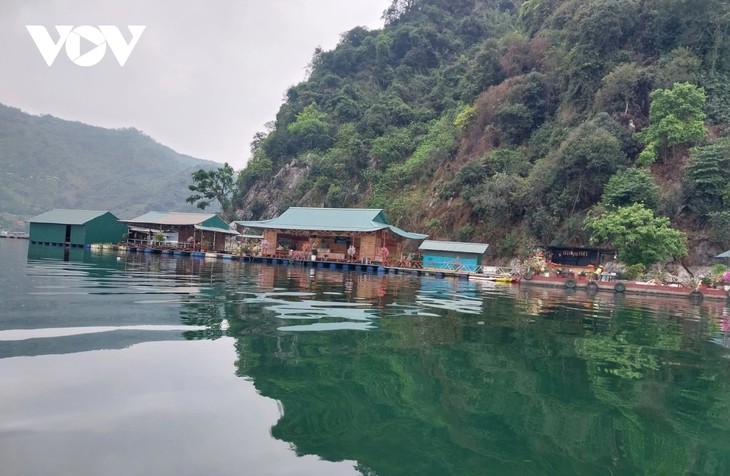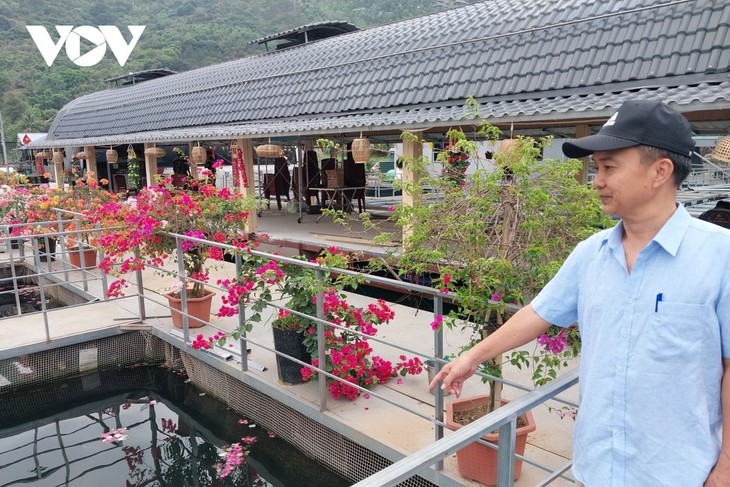(VOVWORLD) - Hoa Binh province’s tourism industry has been developing toward professionalism and sustainability. With the advantages of agriculture and ethnic culture, Hoa Binh is becoming a popular tourist destination.
 A corner of Hoa Binh Lake A corner of Hoa Binh Lake |
Ban Lac in Chieng Chau commune is a Thai ethnic village with 100 families who used to subsist on rice farming. Now it has attracted tourists near and far.
Vi Thi Mai, the first person to do tourism in Ban Lac, says that thanks to State investment and changes in the local mindset about tourism, the local Thai people have made Ban Lac a tourist attraction.
Visitors can enjoy Thai songs and dances and delicious local specialties like dried buffalo meat, pork, sticky rice, bamboo-tube rice, and can wine – usually drunk through multiple bamboo straws from one big jar.
“Tourists to Ban Lac often want to learn about the local culture, food, and cuisine. The locals make bamboo-tube rice and smoked meat to sell to guests,” said Mai.
At Hoa Binh Lake, there are 5,000 fish cages owned by households and businesses that produce 10,000 tons of fish a year. The Hoa Binh Lake National Tourist Area, which extends from Hoa Binh city across Da Bac, Cao Phong, Tan Lac, and Mai Châu district, welcomes thousands of tourists a year.
An overall orientation for tourism development for the area has been approved by the Prime Minister. Hoa Binh province is prioritizing resources to invest in cage fish farming areas and build a high-tech, environmentally friendly fish farming model linked to tourism in the Hoa Binh Lake area.
Luong Thanh Hai, Head of the provincial Sub-Department of Fisheries, said, “The provincial People's Committee has tasked the Department of Agriculture and Rural Development and the Sub-Department of Fisheries with undertaking a project combining cage fish farming of black carp, white carp, and native fish with experiential tourism. Visitors will observe the fish farming operation and sample dishes made from the fish raised in the lake.”
Hoa Binh has developed 160 agricultural and tourism products in line with the standards set by the One Commune One Agricultural Product (OCOP) program, of which 22 products have been rated 4 stars.
Hoang Van Tuan, Deputy Chief of the provincial New Rural Area Coordination Office, said, “Recently, we’ve supported seven OCOP tourism products and helped attract tourists by building OCOP products, logos, and geographical indications, and providing advanced training and foreign language training for managers and personnel serving tourists.”
 Passion Hoa Binh Cooperative has combined tourist products and cage fish farming. Passion Hoa Binh Cooperative has combined tourist products and cage fish farming. |
Hoa Binh agricultural tourism has benefited both agricultural production and rural people, and contributed to diversifying commercial activities, finding output for farm produce, generating jobs, and increasing farmers’ incomes.
Eco-tourism, community tourism, and sports tourism have improved the quality of Hoa Binh tourism and the tourism of the Muong, Thai, Dao, Tay, and Mong ethnic groups.
Bui Xuan Truong, Deputy Director of the provincial Department of Culture, Sports and Tourism, said that a culture and tourism week is organized each year to introduce local tourist attractions and ethnicity. These events also promote farm produce and OCOP products.
“We’ll develop eco-tourism, community tourism, and the culture and traditional sports of our ethnic minorities, organize international cycling and golf tournaments, and develop paragliding to make Hoa Binh's tourism sector competitive with other provinces,” said Truong.
In 2024 Hoa Binh welcomed 3 million tourists, up 10% from the previous year. Combining tourism development and new-style rural building was a solution set out by the provincial administration for 2025.
Under the plan, by the end of the year, every district and city in Hoa Binh will have at least one officially recognized rural tourism destination, which will leverage local advantages in agriculture, culture, craft villages, and ecology.